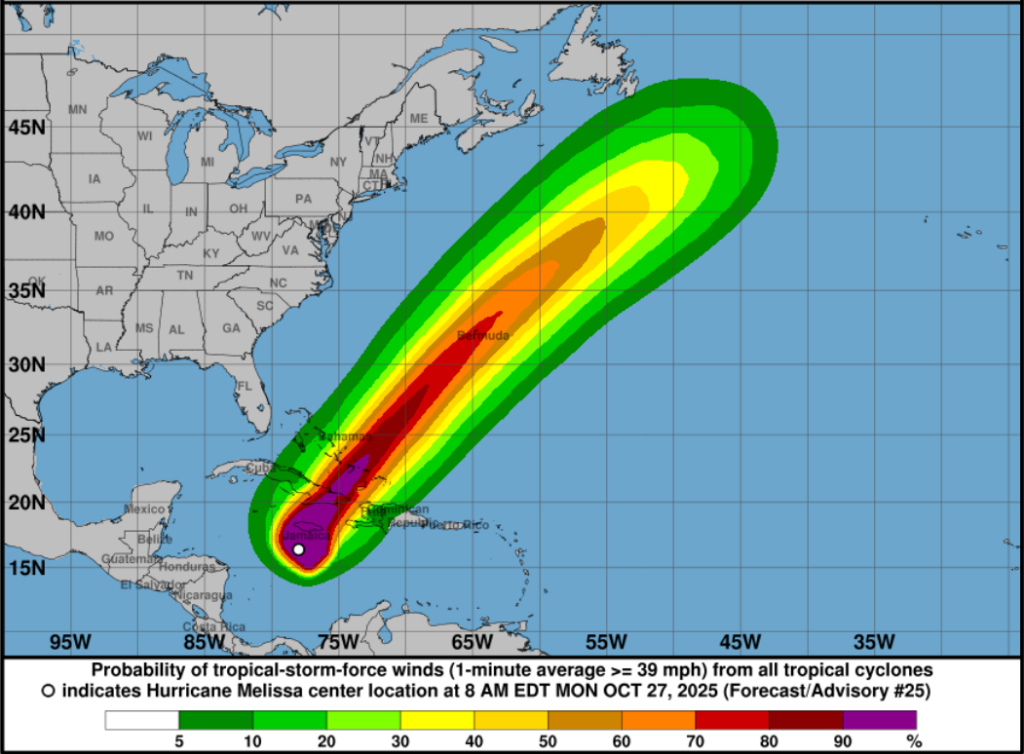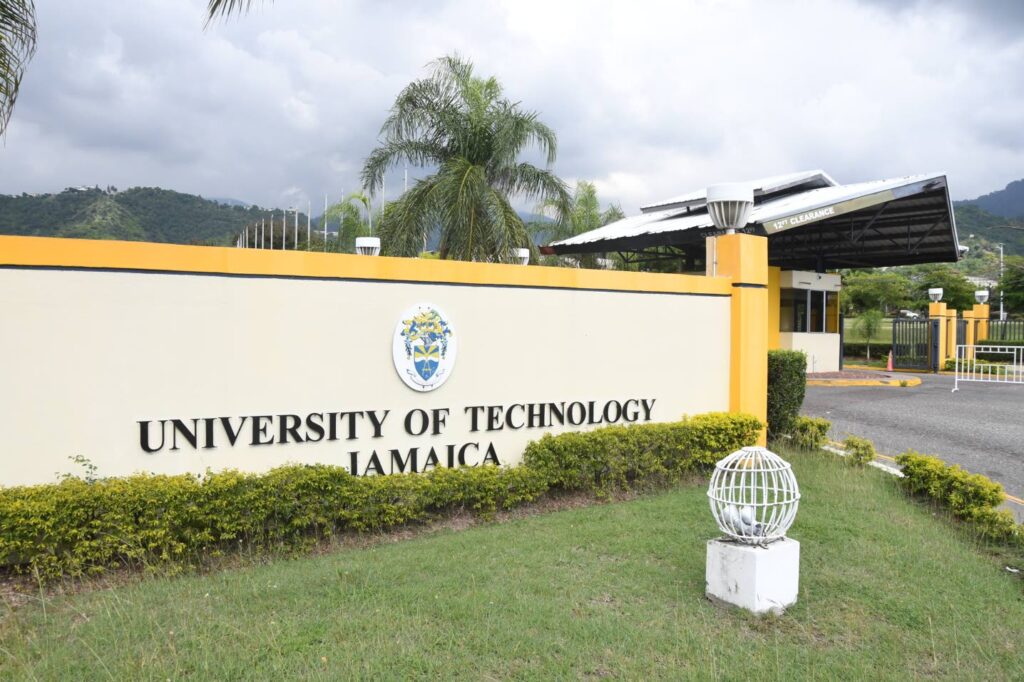KINGSTON, Jamaica — Tropical Storm Melissa has left a significant portion of Jamaica in the dark, with approximately 51,439 customers of the Jamaica Public Service (JPS) Company experiencing power outages as of Monday morning. The disruption was detailed by Minister of Energy and Telecommunications Daryl Vaz during a press briefing.
博客
-

#EyeOnMelissa: Security forces evacuate from Norwood as Hurricane Melissa nears
In anticipation of Hurricane Melissa’s arrival, security forces in Norwood, St James, have proactively relocated some of their operational infrastructure. The site, previously occupying a community playfield as part of the Zones of Special Operation initiative, now appears significantly less populated, with only a few structures remaining. The removed buildings primarily consisted of tents that had been utilized to accommodate staff. While the exact relocation site remains undisclosed, sources suggest that a base near the airport is the likely destination. This strategic move underscores the authorities’ commitment to safeguarding both personnel and resources in the face of the impending natural disaster.
-

PNM Tobago urges Barbados PM to speak with Persad-Bissessar
Amid escalating geopolitical tensions in the Caribbean, PNM Tobago leader Ancil Dennis has called on Barbados Prime Minister Mia Mottley to engage in dialogue with Trinidad and Tobago’s Prime Minister Kamla Persad-Bissessar, urging for “cool heads” to prevail. Dennis likened the current conflict involving the US, Venezuela, and Trinidad and Tobago to a game of all-fours, cautioning that while Persad-Bissessar may feel empowered, the situation remains unpredictable. His appeal follows Venezuela’s accusation that Trinidad and Tobago is collaborating with the CIA, a claim that arose after the USS Gravely, a US warship, arrived in Trinidad for a five-day military exercise with the TT Defence Force. The Ministry of Foreign Affairs defended the visit, stating it aims to combat transnational crime and enhance security cooperation. Dennis emphasized the Caribbean’s historical commitment to peace, rooted in its struggles against colonization and its dedication to sovereignty and non-interference. He highlighted the region’s preference for cultural and sporting rivalries over militarized conflicts, warning against the dangers of being drawn into external wars. Dennis urged Mottley to remind Persad-Bissessar of the Caribbean’s values, advocating for diplomacy and creative solutions to regional challenges. He concluded with a call for unity, stressing that the Caribbean’s strength lies in its ability to prioritize peace over conflict.
-

CWU disagrees with JTUM’s budget endorsement
The Communications Workers’ Union (CWU) has publicly distanced itself from the Joint Trade Union Movement’s (JTUM) endorsement of the 2026 national budget, asserting that it cannot support a fiscal plan that prioritizes financial stability over the immediate needs of workers. In a statement released on October 24, the CWU emphasized its independence and dissenting views on the budget, despite remaining a member of JTUM. The union criticized the government’s focus on balance sheets, arguing that the budget fails to address the rising costs of living, stagnant wages, and the struggles of working-class citizens. The CWU also highlighted the lack of meaningful provisions to restore workers’ purchasing power, which has been eroded by inflation and currency devaluation. Additionally, the union condemned the government’s neglect of the productive sector, pointing to insufficient allocations for manufacturing, agriculture, and industrial diversification. CWU Secretary General Joanne Ogeer clarified that the union’s stance was issued to correct misconceptions after parliamentary discussions referenced its earlier budget analysis. Ogeer reiterated the CWU’s commitment to holding any government accountable, regardless of its affiliation with JTUM or political parties.
-

A short column about killing
The government of Trinidad and Tobago (TT) has sparked widespread debate and criticism for its aggressive policies centered around state-sanctioned killing. Since assuming office six months ago, Prime Minister Kamla Persad-Bissessar has prioritized executions, advocating for the resumption of the death penalty for prisoners on Death Row. This stance has been further reinforced by Defence Minister Wayne Sturge’s promotion of ‘shoot first, kill first’ legislation, framed as a stand-your-ground policy. Most recently, the PM has aligned TT with the United States’ controversial strategy of targeting small boats in the Caribbean Sea, a move that has been described by international observers as a ‘kill them all violently’ approach to foreign policy. Critics argue that these measures lack empirical evidence to support their efficacy. The global trend has shifted away from the death penalty, with studies showing it does not deter crime. Similarly, stand-your-ground laws in the U.S. have led to increased violence rather than reduced crime. The U.S. government’s tactic of extrajudicial killings at sea to combat drug trafficking has also been widely criticized as ineffective and counterproductive. Mexico’s ongoing cartel violence, with over 30,000 homicides annually, serves as a stark reminder that murder does not equate to peace. The TT government’s reliance on such medieval solutions raises questions about its legitimacy and effectiveness. As the U.S. reportedly destroys nine small boats, killing 37 people, including two TT citizens, the Prime Minister has yet to define what constitutes success in this brutal anti-drug policy. Attorney General John Jeremie’s lamentation of TT’s high murder rate and near ‘state of anarchy’ further highlights the irony of a government attempting to curb violence through more violence. This approach not only undermines the social contract but also risks plunging society into deeper chaos, as even political philosopher Thomas Hobbes acknowledged that a government’s legitimacy hinges on its ability to protect, not threaten, its citizens.
-

What are prisons for?
The purpose and efficacy of prisons in Trinidad and Tobago have come under intense scrutiny, particularly in light of the country’s chronic delays in the justice system. Debbie Jacob, a long-time advocate and educator within the prison system, has highlighted these issues, drawing parallels to the systemic racial injustices in the United States as described in Michelle Alexander’s seminal work, *The New Jim Crow: Mass Incarceration in the Age of Colorblindness*. Alexander’s book, which has influenced legal education and advocacy in the U.S., argues that prisons serve as a modern form of racialized social control—a perspective that resonates with Jacob’s observations in Trinidad and Tobago.
Jacob began teaching at the Youth Training Centre (YTC) in 2010, where she encountered young men aged 24-26 still awaiting trial in a facility designed for 16-18-year-olds. The delays in the justice system have only worsened, with many individuals losing over a decade of their lives waiting for their day in court. This prolonged uncertainty often forces the accused to plead guilty, undermining the very essence of justice. In 2010, 67% of the prison population was on remand, a figure Jacob fears has since increased, placing a significant financial burden on taxpayers for housing, feeding, and transporting these individuals.
Despite some progress, such as the introduction of electronic filing and virtual courtrooms under former Chief Justice Ivor Archie, systemic delays remain a defining feature of the judiciary. Jacob questions the integrity of investigations and the ease with which individuals are incarcerated, often without solid evidence. Her concerns are compounded by the low murder detection rate and the police’s decision to create their own prison system, further eroding public trust.
Jacob’s work underscores a pressing need for reform. She challenges the judiciary to address these delays and ensure that prisons serve their intended purpose—rehabilitation and justice—rather than perpetuating a cycle of injustice and inefficiency.
-

#EyeOnMelissa: Hurricane-force winds to begin tonight as Melissa moves over Jamaica
KINGSTON, Jamaica — The US National Hurricane Center (NHC) has issued a dire warning as Hurricane Melissa, a Category 5 storm, approaches Jamaica. The NHC predicts that ‘catastrophic’ and ‘life-threatening’ hurricane-force winds will begin battering the island nation Monday night, persisting into early Tuesday. Tropical storm conditions are already underway, with the eyewall expected to cause total structural failure, particularly in elevated regions where wind speeds could surge by up to 30%. As of the latest update, Hurricane Melissa was positioned near latitude 16.4 north and longitude 78.2 west, moving westward at three miles per hour. The storm is anticipated to shift northwest and north later Monday, accelerating northeastward on Tuesday. Its trajectory suggests Melissa will sweep over Jamaica Monday night and early Tuesday, southeastern Cuba Tuesday night, and the southeastern Bahamas on Wednesday. With maximum sustained winds nearing 165 mph (270 km/h) and higher gusts, Melissa remains a formidable threat. The NHC cautions that intensity fluctuations are likely before the hurricane makes landfall in Jamaica on Tuesday.
-

West Indies grab 1-0 T20 series lead against Bangladesh
The West Indies cricket team secured a commanding 1-0 lead in their three-match T20 series against Bangladesh with a hard-fought 16-run victory in the opening game on October 27 in Chattogram. Opting to bat first, the West Indies openers, Alick Athanaze and Brandon King, laid a solid foundation with a 59-run partnership. However, their progress was cautious, with boundaries proving elusive. Athanaze departed for 34 off 27 balls, followed by King for 33 off 36 deliveries, leaving the team at 82/3 by the 13th over. Captain Shai Hope and former skipper Rovman Powell then took charge, accelerating the innings with a flurry of boundaries. Their unbeaten partnership of 83 runs propelled the West Indies to a competitive total of 165/3 in their allotted 20 overs. Hope finished with 46 not out, while Powell remained unbeaten on 44. Taskin Ahmed was the standout bowler for Bangladesh, claiming 2/36. In reply, Bangladesh started aggressively but lost early wickets, including Tanzid Hasan and captain Litton Das. Despite a valiant effort from Tanzim Hasan Sakib, who scored 33 off 27 balls, Bangladesh faltered, bowled out for 149 in 19.4 overs. The West Indies’ bowling attack, led by Jason Holder (3/31) and Jayden Seales (3/32), proved decisive. Akeal Hosein also contributed with 2/22. The second match of the series is scheduled for October 29.
-

Angostura reports over $100m in profit
Angostura Holdings Ltd has unveiled impressive financial results for the nine-month period ending September 30, 2025, showcasing robust growth across key metrics. The company reported $757 million in revenue and a $145 million profit before tax, with profit after tax climbing 10 per cent to $104 million. Total assets expanded by six per cent year-over-year to $1.9 billion, supported by a low debt ratio of 0.16. Earnings per share also rose from $0.46 to $0.51, reflecting the company’s strong performance. The international segment experienced significant growth, with Branded Rum sales surging 182 per cent and Angostura Chill sales increasing by eight per cent. Exports now account for 45 per cent of total group revenue, while domestic growth rose by three per cent, driven by the launch of new ready-to-drink products. Operating activities generated $124 million, up from $113 million, and finance income grew by 42 per cent due to strong returns from US dollar investments. Recently appointed chairman Gary Hunt expressed optimism about sustaining long-term growth and maximizing shareholder value through innovation and operational excellence. The company’s board underwent significant changes in 2025, with six former directors resigning in June and five new members appointed in August. These changes delayed the approval of a final dividend of $0.28 per share, originally scheduled for July 31, 2025. Angostura’s financial momentum continues, having achieved $33 million in profit before tax in the first quarter of 2025 and surpassing $1 billion in revenue for the financial year ended December 31, 2024.
-

#EyeOnMelissa: UTech suspends classes due to Hurricane Melissa
KINGSTON, Jamaica — In response to the escalating severity of Hurricane Melissa, the University of Technology, Jamaica, has announced the immediate suspension of all academic activities. The decision, effective from Monday, will remain in force until further notice, as the hurricane is anticipated to strike the region between late Monday and Tuesday. The university emphasized that this measure prioritizes the safety and well-being of its students and staff. In an official statement released on Monday, the institution urged all members of its community to stay indoors, refrain from non-essential travel, and stay updated through official channels, including the university and national emergency agencies. Despite the suspension, essential support and welfare services will continue to operate for international students and authorized local residents who have opted to remain on campus.
